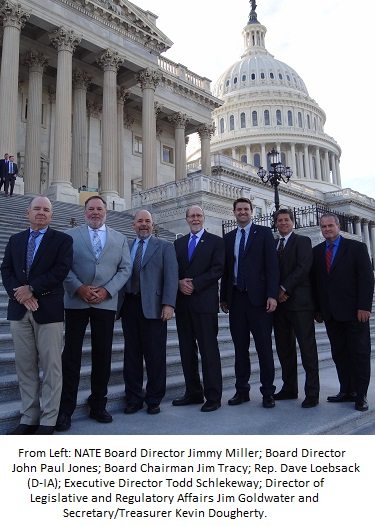NATE Goes to Washington-Spring 2018
Several representatives of the National Association of Tower Erectors (NATE) came to Washington, D.C. last week to lobby Congress, the FCC and various government agencies. They had 43 meetings in 4.5 days, and say the association has built up credibility in the Nation’s Capitol, to the point that federal agencies and lawmakers now seek NATE’s input on potential future legislation and rule changes.
Inside Towers Washington Bureau Chief Leslie Stimson sat down with six members of their lobbying team to discuss NATE’s regulatory priorities and get a sense of their meetings. Sitting at the table were: NATE Board Director John Paul Jones, Board Chairman Jim Tracy, Secretary/Treasurer Kevin Dougherty, Board Director Jimmy Miller, Executive Director Todd Schlekeway and Director of Legislative and Regulatory Affairs Jim Goldwater. In part One of our series, today’s topic is the tower jobs training bill that NATE had input into before it was introduced in Congress.
IT: Reps. Dave Loebsack (D-IA) and Markwayne Mullin recently introduced the Communications Jobs Training Act of 2018 in the House to train communications tower workers. The measure would create a program through the FCC to establish, or expand, job training programs for communications tower service, construction and maintenance. It would provide up to $20 million per year in fiscal years 2018-2020 in competitive grants for various universities, community colleges and technical education programs to develop and administer the training. How did that come about?
Goldwater: We went up to the Capitol last fall and had discussions with Reps. Loebsack and Mullin.
Tracy: As political novices, it’s cool to have them rely on us for information and to review the language of the bill. We were able to put together the nuts and bolts of how this was going to affect our members.
Goldwater: Jim testified last July before the the House Energy and Commerce Committee [about the tower worker shortage for the repack, 5G and other tower work]. Loebsack is on the committee. We met with Loebsack’s staff in October. In between, they had developed this draft bill. They asked our view on it. ‘Can you get back to us within a week?’ We thought it was so important we got back to them within 24 hours with a series of amendments that we thought would improve the bill. Every single one of them was accepted by Mr. Loebsack’s staff.
IT: What kinds of amendments?
Tracy: We added vocational technical schools, and we added veterans.
Goldwater: We also added an amendment on funding. It was originally a one-year bill. We thought since the repack was a three-year process at least, we should be encouraging funding for a longer period of time, which they accepted.
IT: What’s next?
Tracy: I think it’s going to be essential for this bill to keep moving through Congress. What will that take, Mr. Goldwater?
Goldwater: A lot of pushing
IT: To get it done by when? Fall?
Goldwater: It’s a short election year so there are competing interests. Right now there are a bunch of essential bills [pending]. Any budget/appropriations bills have to pass, as well as infrastructure and the FAA reauthorization, which is proceeding. There will be a lot of other bills that will be competing for time. There are something like 30 bills that are before the House Communications and Technology Subcommittee. Whether they go individually or would they try to roll them all up in one omnibus bill is unclear at this point. We don’t know what’s going to happen, but Congressman Loebsack and Congressman Mullin are both committed to moving this.
IT: When would you like to see it pass?
Goldwater: Tomorrow
Schlekeway: There could be other vehicles. It could be in the spending bill for the following year.
Goldwater: What I would like to see is an omnibus bill incorporating [the measure]. Just like when we work with other organizations, there’s strength in numbers. That’s the way it is with this. A standalone bill may be able to go, but it can attract more support if you have different members supporting different facets of the bill.
Schlekeway: The three-year provision of the Loebsack bill is timed perfectly with the repack.
Tracy: And the long-term needs of the industry. Because if they use it for say, curriculum development, now you’ve got something that can be repeated by the vocational schools, by the military training programs, by the community colleges. Because if you have a curriculum and an instructor, it’s pretty natural to keep that going. This is kind of a short-term bill if you think about it for three years, but at the end of three years you have programs set up all over the United States.
By Leslie Stimson, Inside Towers Washington Bureau Chief
May 4, 2018





Reader Interactions